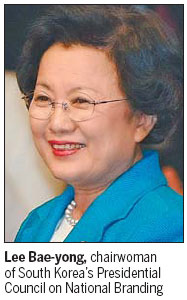Soft power key to image building

The ultimate recipe for building a country's image lies in its soft power to "win peoples' hearts", and good story-telling is a plus, the top national brand planner for Seoul told China Daily.
Lee Bae-yong, chairwoman of South Korea's Presidential Council on Nation Branding, leads the country's top publicity team in its efforts to impress the world by showing an elegant side of the booming economy in Northeast Asia.
"Just as consumers select products based on brand, countries evaluate each other based on the impression of their exposure to a nation's people, products and quality of service," she said.
The nation branding council, proposed by South Korean President Lee Myung-bak and established in 2009, consists of entrepreneurs, government officials and experts, who endeavor to make the best out of their considerable experiences and wisdom.
"As a council directly responsible to the president, we convene related government departments at the start of every year to nail down annual projects that are fit for campaigning, and revisions will be given as the year ends," the chairwoman said.
The soft power and fine quality of a nation's people are integral to building its image and are especially important for countries like China, which Lee expects to join the ranks of developed countries in the future. "China has excellent cultural resources, and good story-telling will give the resources an internationalized reach," Lee said.
The chairwoman suggested that China, as a densely populated country, project a national image of tenderness and orderliness, which will contribute to a higher level of national brand.
"What the international community expects from a country like China is practicing voluntary activities overseas, making contributions to the global community and showing its willingness to share with other countries," she said.
Setting up a national branding committee will help China "categorize and manage the resources in hand", she said.
Lee also hailed the role of online communication tools for their "convenience and diversity" in delivering messages to impress other countries.
Seoul is promoting its national image through bloggers and social network services. "It makes no difference if the campaigns are geologically limited within the nation," Lee said.
A group of South Korean student reporters based in the country and overseas have been engaged in sharing content relevant to national branding, the chairwoman said.
South Korea has impressed the world with a series of major events, such as the G20 summit in 2010 and the second Nuclear Security Summit in 2012, and Lee said they have used branding elements that demonstrate the country's well-received cultural image and consistent economic growth.
Many leaders have told Lee that they were impressed by the Seoul G20 Summit because the leaders' meeting was held in the National Museum of Korea, a location with an atmosphere that makes leaders feel comfortable and exposes them to the country's "cultural appeal".
Seoul has used news conferences for campaigns, national branding pavilions and indoor cultural exhibition booths to generate publicity during major international events, Lee said.
Many major summit events that have solemn themes, such as the Nuclear Security Summit in March, have been a challenge for national image planners, Lee said.
"It is pretty easy to upset the visitors and attendees, yet we took the chance to elaborate on an atmosphere for seeking peace," Lee said of the cultural shows and performances organized to greet prominent leaders from more than 50 countries attending the nuclear summit.
Spontaneous support from South Korean citizens for Seoul-based events has also touched the chairwoman, as local residents have participated in campaigns to prevent traffic congestion and shut down stores to display an orderly downtown.
"Winning the trust of others lies in the ultimate pursuit of a brand," Lee said. "The image of South Korean nationals, as well as their dynamic involvement (in building the image), are among the recipes for success."
South Korea has witnessed rapid growth in its domestic economy to become a developed country, and the chairwoman said sharing and contributing to the whole world is "the only path" to win trust from around the globe.
"Flashy dresses and a good fortune do not necessarily mean that you can get due respect. Respect from the international community is available only when you have made contributions voluntarily and boosted your taste and public remarks," she said.
zhangyunbi@chinadaily.com.cn


















